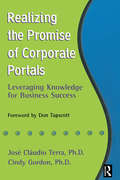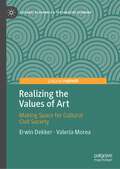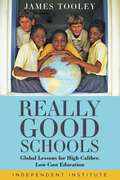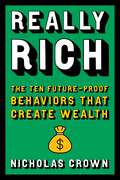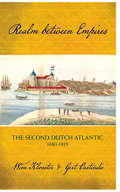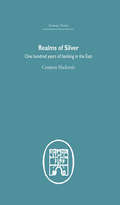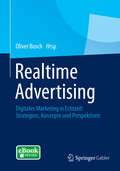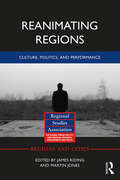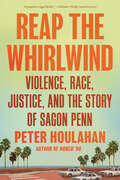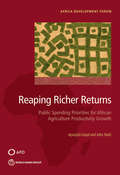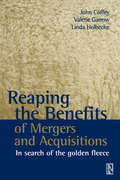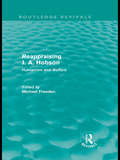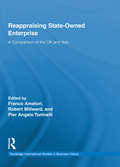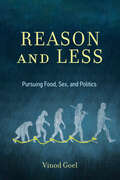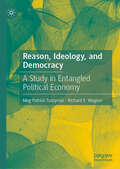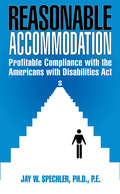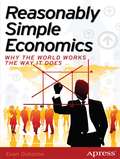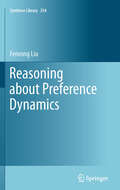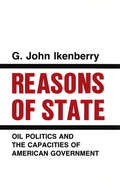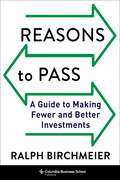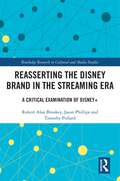- Table View
- List View
Realizing the Promise of Corporate Portals
by Jose Claudio Terra Cindy GordonThoughtful and provocative, 'Realizing the Promise of Corporate Portals' illustrates the vast potential of corporate portals and what your company can do to implement them for business success. Based on the authors' extensive backgrounds and consulting focused on implementing corporate portals this exciting new book extends IT theory into business strategy. Terra and Gordon explore the components and architecture of typical corporate portals and fundamental issues in knowledge management. Geared for decision makers at the executive level, this book provides a comprehensive view of the market landscape, powerful and detailed case studies, and collected best practices and lessons learned to help organizations successfully implement corporate portals. The book also includes detailed checklists necessary for selecting and implementing appropriate corporate portal technical solutions.Learn from their detailed case studies of hugely successful corporate portal implementations, including:* ADC Telecommunications Inc.* Bain & Company* Bank of Montreal* Context Integration* Eli Lilly* Hill & Knowlton* Nortel Networks* SERPRO* Siemens* Texaco * Xerox
Realizing the Values of Art: Making Space for Cultural Civil Society (Cultural Economics & the Creative Economy)
by Erwin Dekker Valeria MoreaThis book provides a novel approach to the understanding and realization of the values of art. It argues that art has often been instrumentalized for state-building, to promote social inclusion of diversity, or for economic purposes such as growth or innovation. To counteract that, the authors study the values that artists and audiences seek to realize in the social practices around the arts. They develop the concept of cultural civil society to analyze how art is practiced and values are realized in creative circles and co-creative communities of spectators. The insights are illustrated with case-studies about hip-hop, Venetian art collectives, dance festivals, science-fiction fandom, and a queer museum. The authors provide a four-stage scheme that illustrates how values are realized in a process of value orientation, imagination, realization, and evaluation.The book relies on an interdisciplinary approach rooted in economics and sociology of the arts, with an appreciation for broader social theories. It integrates these disciplines in a pragmatic approach based on the work of John Dewey and more recent neo-pragmatist work to recover the critical and constructive role that cultural civil society plays in a plural and democratic society. The authors conclude with a new perspective on cultural policy, centered around state neutrality towards the arts and aimed at creating a legal and social framework in which social practices around the arts can flourish and co-exist peacefully.
Really Good Schools: Global Lessons for High-Caliber, Low-Cost Education
by James TooleyAlmost overnight a virus has brought into question America&’s nearly 200-year-old government-run K-12 school-system—and prompted an urgent search for alternatives. But where should we turn to find them?Enter James Tooley&’s Really Good Schools. A distinguished scholar of education and the world&’s foremost expert on private, low-cost innovative education, Tooley takes readers to some of the world&’s most impoverished communities located in some of the world&’s most dangerous places—including India and such war-torn countries as Sierra Leone, Liberia, and South Sudan. There, in places where education &“experts&” fear to tread, Tooley finds thriving private schools that government, multinational NGOs, and even international charity officials deny exist. Why? Because the very existence of low-cost, high-quality private schools shatters the prevailing myth in the U.S., U.K., and western Europe that, absent government, affordable, high-quality schools for the poor could not exist. But they do. And they are ubiquitous and in high demand. Founded by unheralded, local educational entrepreneurs, these schools are proving that self-organized education is not just possible but flourishing—often enrolling far more students than &“free&” government schools do at prices within reach of even the most impoverished families. In the course of his analysis Tooley asks the key questions: What proportion of poor children is served? How good are the private schools? What are the business models for these schools? And can they be replicated and improved? The evidence is in. In poor urban and rural areas around the world, children in low-cost private schools outperform those in government schools. And the schools do so for a fraction of the per-pupil cost. Ubiquity, affordability, quality, value for money, equity, choice, and sustainability—these are the seven categories by which schooling should be judged, according to Tooley. In every instance, one is forced to conclude that low-cost, non-governmental, entrepreneurial education, as practiced by the poor around the globe, contains the key to their rise to prosperity and leadership positions within their own respective cultures. Alarmed by recent government barriers in education, Americans can now find hope in the triumph—in the face of acute adversity—of these remarkable schools. Because of the pandemic, parents in America and Europe are discovering that the education of their children is indeed possible—and likely far better—without government meddling with rigid seat-time mandates, outdated school calendars, absurd age-driven grade levels, and worse testing regimes. And having experienced the first-fruits of educational freedom, parents will be increasingly open to the possibilities of ever greater educational entrepreneurship and innovation. Thankfully, they have Really Good Schools to show the way.
Really Rich: The Ten Future-Proof Behaviors that Create Wealth
by Nicholas CrownFrom the creator of the viral series Rich vs. Really Rich, comes a modern formula for building wealth in today&’s economy that optimizes your quality of life over the amount in your bank account.Really Rich is a timely work of prescriptive finance by social media influencer and entrepreneur Nicholas Crown. Crown provides readers with an original, ten-point formula for building wealth and happiness:, including: 1. Create Value: Get rich by making someone else's life easier 2. Understand that time is priceless 3. Optimize for quality of life, not a dollar amount 4. Kindness is an accelerant to wealth Crown encourages his audience to embrace three foundational points: humility, iteration, and the world. These tools are essential for achieving your goals.
Realm between Empires: The Second Dutch Atlantic, 1680-1815
by Gert Oostindie Wim KloosterWim Klooster and Gert Oostindie present a fresh look at the Dutch Atlantic in the period following the imperial moment of the seventeenth century. This epoch (1680–1815), the authors argue, marked a distinct and significant era in which Dutch military power declined and Dutch colonies began to chart a more autonomous path.The loss of Brazil and New Netherland were twin blows to Dutch imperial pretensions. Yet the Dutch Atlantic hardly faded into insignificance. Instead, the influence of the Dutch remained, as they were increasingly drawn into the imperial systems of Britain, Spain, and France. In their synthetic and comparative history, Klooster and Oostindie reveal the fragmented identity and interconnectedness of the Dutch in three Atlantic theaters: West Africa, Guiana, and the insular Caribbean. They show that the colonies and trading posts were heterogeneous in their governance, religious profiles, and ethnic compositions and were marked by creolization. Even as colonial control weakened, the imprint of Dutch political, economic, and cultural authority would mark territories around the Atlantic for decades to come.Realm between Empires is a powerful revisionist history of the eighteenth-century Atlantic world and provides a much-needed counterpoint to the more widely known British and French Atlantic histories.
Realms of Silver: One Hundred Years of Banking in the East (International Finance Ser.)
by Compton MackenzieOriginally published in 1954 this volume looks at the difficulties encountered by the founders of the Chartered Bank of India, Australia and China in seeking, a hundred years ago, to establish the awakening countries of the East, British standard of financial probity and commercial integrity and then goes on to relate how the Bank was able to foster trade and industry in the lands to which its establishment was extended and to co-operate in the reform of archaic systems of currency.
Realtime Advertising
by Oliver BuschDieses Grundlagenwerk zu Realtime Advertising erklärt praxisnah und fundiert, welche Rolle automatisierte Echtzeit-Werbung in einem orchestrierten Media-Mix spielt und wie sie von Grund auf funktioniert. Denn: Realtime Advertising ist für Marketingverantwortliche so neu, bedrohlich und chancenreich wie die Internetwerbung zur Jahrtausendwende und selbst für viele Marketing- und Mediaexperten erklärungsbedürftig. Führende Branchenexperten aus Unternehmen, Agenturen und Medien erläutern diese revolutionäre Art des digitalen Marketings: Prof. Dr. Jürgen Seitz, Dr. Mark Grether, Aee-Ni Park, Rosa Markarian, Prof. Dr. Burkhardt Funk, Thomas Schauf, Philip Missler, Stanton Sugarman, Kate Burgarth, Stephan Noller, Marco Klimkeit, Edmund Heider, Holm Münstermann, Ingo Tenbrock, Nils Hachen, Arndt Groth, Viktor Zawadzki, Oliver Gertz, Patrick Dawson, Kolja Brosche, Sven Weisbrich, Arno Schäfer, Oliver Weiss, Alexander Gösswein, Sascha Jansen, Wolfgang Bscheid und Julian Simons. Die Autoren liefern außerdem klare Handlungsempfehlungen und handfeste Praxistipps für die begonnene Transformation des Marketings. Extra: Inklusive eBook - den Zugangs-Coupon finden Sie im Buch.
Realty Check: Real Estate Secrets for First-Time Canadian Home Buyers
by Sandra RinomatoTop advice from one of television's most well-known Realtors. Buying a home for the first time can be a daunting and stressful endeavor. The myriad questions and issues that arise can be overwhelming, resulting in an experience completely different from what first-time buyers were expecting. Sandra Rinomato, the host of the hit HGTV show Property Virgins, delivers a "realty check" by pointing buyers to homes that fit their budget, satisfy their needs, and most importantly, achieve their goal of home ownership. Realty Check covers such topics as: How to finance your home purchase without going broke. How to look past home staging and focus on the crucial elements of a potential property. Home inspection and exactly what it entails. Tips for condominium buyers. How to find and work with a good Realtor. Mortgage fraud and other legal issues. Buying a first property is a major commitment, but readers of this book will be well-prepared to take the leap into home-ownership, with their eyes wide open.
Reanimating Regions: Culture, Politics, and Performance (Regions and Cities)
by Martin Jones James RidingWriting regions, undertaking a regional study, was once a standard form of geographic communication and critique. This was until the quantitative revolution in the middle of the previous century and more definitively the critical turn in human geography towards the end of the twentieth century. From then on writing regions as they were experienced phenomenologically, or arguing culturally, historically, and politically with regions, was deemed to be old-fashioned. Yet the region is, and always will be, a central geographical concept, and thinking about regions can tell us a lot about the history of the discipline called geography. Despite taking up an identifiable place within the geographical imagination in scholarship and beyond, region remains a relatively forgotten, under-used, and in part under-theorised term. Reanimating Regions marks the continued reinvigoration of a set of disciplinary debates surrounding regions, the regional, and regional geography. Across 18 chapters from international, interdisciplinary scholars, this book writes and performs region as a temporary permanence, something held stable, not fixed and absolute, at different points in time, for different purposes. There is, as this expansive volume outlines, no single reading of a region. Reanimating Regions collectively rebalances the region within geography and geographical thought. In renewing the geography of regions as not only a site of investigation but also as an analytical framework through which to write the world, what emerges is a powerful reworking of the geographic imagination. Read against one another, the chapters weave together timely commentaries on region and regions across the globe, with a particular emphasis upon the regional as played out in the United Kingdom, and regional worlds both within and beyond Europe, offering chapters from Africa and South America. Addressing both the political and the cultural, this volume responds to the need for a consolidated and considered reflection on region, the regional, and regional geography, speaking directly to broader intellectual concerns with performance, aesthetics, identity, mobilities, the environment, and the body.
Reap the Whirlwind: Violence, Race, Justice, and the Story of Sagon Penn
by Peter HoulahanThe bestselling author of Norco &’80 returns with a riveting story of mid-1980s San Diego that placed one young Black man at the center of a whirlwind of crime and punishment that profoundly altered Southern CaliforniaMarch 31, 1985. Two white patrol officers in search of a gang member followed a pickup truck carrying seven young Black men up a dirt driveway in the Encanto neighborhood of Southeastern San Diego. Minutes later, gunshots rang out, and the truck&’s driver, Sagon Penn, fled the scene in an officer&’s patrol car. The incident stunned the city. What followed would change it forever.Penn was an idealist who believed in the power of Buddhist chants to bring about the oneness of humanity. The two police officers were rising stars in one of the most progressive police departments in the country, yet one that had suffered more officers killed in the line of duty than any other. While the facts of the case were never in dispute, what remained unresolved was what, if anything, could justify such a violent confrontation? For over two years, a determined prosecutor and a charismatic defense attorney engaged in a sensational courtroom drama that revolved around matters of mental health, racial biases, and the self-image of a once-sleepy beach town grappling with its transformation into a major metropolitan area. The Sagon Penn incident forever altered how San Diego would respond to incidents involving police and communities of color.Based on court transcripts, personal interviews, and archival police reports, Reap the Whirlwind is a gripping true-crime narrative set against the evocative backdrop of Southern California.
Reaping Returns from Community Investments: Why It Pays for Your Company to Give Back
by Jody HeymannSince members of the community often constitute a company's labor force in addition to its customer base, support from the community can facilitate both production and sales, just as opposition can significantly impede expansion. As a result, a company's relationship with the community can be a critical determinant of its economic future. This chapter shows you how your company can invest in communities during both stable and turbulent economic times. Whether you're improving the local community college or helping build much-needed infrastructure, providing transformative services to the community on any scale can greatly improve your company's public image, its employee retention rate, its performance, and its ability to expand. This chapter was originally published as Chapter 8 of "Profit at the Bottom of the Ladder: Creating Value by Investing in Your Workforce."
Reaping Richer Returns: Public Spending Priorities for African Agriculture Productivity Growth
by John Nash Aparajita GoyalEnhancing the productivity of agriculture is vital for Sub-Saharan Africa's economic future and is one of the most important tools to end extreme poverty and boost shared prosperity in the region. How governments elect to spend public resources has significant development impact in this regard. Choosing to catalyze a shift toward more effective, efficient, and climate-resilient public spending in agriculture can accelerate change and unleash growth. Not only does agricultural public spending in Sub-Saharan Africa lag behind other developing regions but its impact is vitiated by subsidy programs and transfers that tend to benefit elites to the detriment of poor people and the agricultural sector itself. Shortcomings in the budgeting processes also reduce spending effectiveness. In light of this scenario, addressing the quality of public spending and the efficiency of resource use becomes even more important than addressing only the level of spending. Improvements in the policy environment, better institutions, and investments in rural public goods positively affect agricultural productivity. These, combined with smarter use of public funds, have helped lay the foundations for agricultural productivity growth around the world, resulting in a wealth of important lessons from which African policy makers and development practitioners can draw. 'Reaping Richer Returns: Public Spending Priorities for African Agriculture Productivity Growth' will be of particular interest to policy makers, development practitioners, and academics. The rigorous analysis presented in this book provides options for reform with a view to boosting the productivity of African agriculture and eventually increasing development impact.
Reaping the Benefits of Mergers and Acquisitions: In Search Of The Golden Fleece
by John Coffey Linda Holbeche Valerie GarrowWill the early years of the new century continue to witness the huge growth in merger and acquisition activity which marked the end of the last? The chances are that they will - witness the value of deals carried out by the top five investment banks in the first quarter of 2001 alone ($456.2 billion). The quest for the golden fleece is alive and well. Will the majority of M&As continue to fail to achieve their potential value? This book is about breaking out of the cycle of grand strategy, great prospects, poor implementation, lost opportunities. The authors believe that it is possible for M&As to realise their value - and more. Bringing home the golden fleece involves more than just setting sail in quest for riches. It's about understanding the destination/end game, and working out the most appropriate route. This book has been written with the practitioner in mind, with the thirteen chapters split into three sections. The first section provides an overview of the merger process and outlining the key elements of success. Section Two focuses on the nuts & bolts of managing the integration process - from transition to full integration. Illustrated by a detailed case study of Articon Integralis AG, the leading supplier of IT Security Solutions and Services in Europe. The final section looks at the themes that can make or break mergers - creating the culture of the new organisation, communications, retention and the roles of line managers and HR. Each section is supported by checklists that should be helpful whether you are a novice at the merger game or an expert.
Reappraising J. A. Hobson: Humanism and Welfare (Routledge Revivals)
by Michael FreedenJ. A. Hobson was one of the most influential social, economic and political theorists of late nineteenth- and early twentieth-century Britain. In this volume, first published in 1990, eight scholars reassess the importance and relevance of his work today and affirm him as a major British thinker. These original studies place Hobson in context by explaining his intellectual antecedents: Cobden, Ruskin, nineteenth-century social and psychological theories and economic thought. The book provides an overview of the novelty and incisiveness of Hobson's contribution to British liberal theory and radical practice. Historians, economists, social and political theorists and students of international affairs will find this an important book for a fuller understanding of early twentieth-century British progressive thought.
Reappraising State-Owned Enterprise: A Comparison of the UK and Italy (Routledge International Studies in Business History)
by Franco Amatori Robert Millward Pier Angelo ToninelliAfter a quarter century of almost general condemnation and rebuttal of the entire nationalization experience, it appears that there are second thoughts about governmental direct intervention in the economy. Reappraising State-Owned Enterprise deals with a topic often undervalued in the past decade but which now, with the crisis of 2008-2009, calls for greater attention: the direct intervention of the State as Entrepreneur. The collection of essays in this volume – prepared by some of the leading authorities in the field – offers a contribution to this debate by providing a balanced assessment of two of the most relevant experiences of mixed economies, the United Kingdom and Italy. In this respect, a comparison between these two countries is very much appropriate since in both nations the State played an important role as "Entrepreneur" starting in the early 20th century. In Great Britain and Italy, the heyday of the "State as Entrepreneur" was in the years right after WWII when it was used as a tool for promoting a modern society in which citizens acquired a stronger sense of belonging to their nations. The UK and Italy saw the State take on a too-pervasive role in the 70s; the two nations responded in different ways. In the 1980s Great Britain embarked on a harsh process of privatizations while Italians struggled on until finally submitting to privatizations in their nation in the following decade. The deep crisis of the final years of the 21st century forced both nations to reconsider State interventions as an appropriate tool in order to protect the wellbeing of the national economy.
Reason and Less: Pursuing Food, Sex, and Politics
by Vinod GoelA new, biologically driven model of human behavior in which reason is tethered to the evolutionarily older autonomic, instinctive, and associative systems. In Reason and Less, Vinod Goel explains the workings of the tethered mind. Reason does not float on top of our biology but is tethered to evolutionarily older autonomic, instinctive, and associative systems. After describing the conceptual and neuroanatomical basis of each system, Goel shows how they interact to generate a blended response. Goel&’s commonsense account drives human behavior back into the biology, where it belongs, and provides a richer set of tools for understanding how we pursue food, sex, and politics. Goel takes the reader on a journey through psychology (cognitive, behavioral, developmental, and evolutionary), neuroscience, philosophy, ethology, economics, and political science to explain the workings of the tethered mind. One key insight that holds everything together is that feelings—generated in old, widely conserved brain stem structures—are evolution&’s solution to initiating and selecting all behaviors, and provide the common currency for the different systems to interact. Reason is as much about feelings as are lust and the taste of chocolate cake. All systems contribute to behavior and the overall control structure is one that maximizes pleasure and minimizes displeasure. Tethered rationality has some sobering and challenging implications for such real-world human behaviors as climate change denial, Trumpism, racism, or sexism. They cannot be changed simply by targeting beliefs but will require more drastic measures, the nature of which depends on the specific behavior in question. Having an accurate model of human behavior is the crucial first step.
Reason of State
by Thomas PooleThis historically embedded treatment of theoretical debates about prerogative and reason of state spans over four centuries of constitutional development. Commencing with the English Civil War and the constitutional theories of Hobbes and the Republicans, it moves through eighteenth-century arguments over jealousy of trade and commercial reason of state to early imperial concerns and the nineteenth-century debate on the legislative empire, to martial law and twentieth-century articulations of the state at the end of empire. It concludes with reflections on the contemporary post-imperial security state. The book synthesises a wealth of theoretical and empirical literature that allows a link to be made between the development of constitutional ideas and global realpolitik. It exposes the relationship between internal and external pressures and designs in the making of the modern constitutional polity and explores the relationship between law, politics and economics in a way that remains rare in constitutional scholarship.
Reason, Ideology, and Democracy: A Study in Entangled Political Economy
by Richard E. Wagner Meg Patrick TuszynskiDemocratic political systems are often thought to be preferable to all others for supporting liberty. Around the world, nations that are more democratic tend to be freer across various aspects of life and human experience. This book undertakes a social scientific analysis of this claim and finds it to be wanting. The reality of democratic systems does not adhere to popular rhetoric. One of the key reasons for this is that our system is an entangled system, one in which the realm of the political and commercial are so intertwined that they cannot be easily separated. Businessmen have political interests, and politicians have commercial interests. The implication of this entanglement is that alleviating the problems that emerge in democratic systems is not a simple matter of rolling back damaging interventions. Due to the logic of entanglement, returning to a “free market” is not possible in most cases. The authors pull economics back to its classical roots to analyze the social orders that best allow people to live together. The world is not constantly aiming at placidity, as the prevailing economics of equilibrium would have us think. We live in a world of change and turbulence, so our social science requires a framework that deals with this turbulence robustly. Classical economists beginning with Adam Smith sought to uncover which forms of human association allowed us to live better together. The authors explain Smith’s observations, asking the same sorts of questions of readers today. Because the baseline assumption of entanglement does not allow one to divide the world so clearly into two distinct structures, the authors parallel Smith’s approach, focusing on forms of association rather than political or commercial structures. Focusing on human association, the authors help readers uncover the manifold structures humans have devised that allow them to tame the turbulence and live lives more harmoniously with others.
Reasonable Accommodation: Profitable Compliance with the Americans with Disabilities Act
by JayW. SpechlerReasonable accommodation is defined as any change in the work environment or in the way business is usually conducted that results in equal employment opportunity for an individual with a disability. With the Americans with Disabilities Act in full swing and more than 35,000 court cases on record, there is much to be done to get most companies into compliance.Reasonable Accommodation: Profitable Compliance with the Americans with Disabilities Act was designed to provide those responsible for diversity and implementing the ADA with specific benchmark examples of how companies have provided accommodations that have had a positive impact on profitability, quality, employee and customer relations.This masterfully written book covers many important topics dealing directly with the ADA. It also provides numerous technologies available that can greatly increase productivity and quality of performance for disabled employees, as well as a "who's who" of case studies including: AT&T, Boeing, Federal Express, Ford Motor Co., Bank of America, Digital Equipment, General Electric Co., IBM, Motorola, WAUSAU Insurance Co., Sears Roebuck, Philip Morris, and many more.
Reasonably Simple Economics
by Evan OsborneThe goal of Reasonably Simple Economics is, not surprisingly, simple: to help us think like economists. When we do, so much of the world that seemed mysterious or baffling becomes more clear and understandable--improving our lives and providing new tools to succeed in business and career. In a chatty style, economist Evan Osborne explains the economic foundations behind the things we read about or see in the news everyday: Why prices for goods and services are what they are How government spending, regulation, and taxation can both hinder and help the economy Why and how some people get fabulously rich How entrepreneurs reorganize society beneficially Why markets sometimes fail and when or if governments should intervene when they do How economics and statistics can explain such things as discrimination in hiring and providing services (and why discriminators are shooting themselves in the foot), why we're smarter than we've ever been, and how technology makes the idea of Earth's "carrying capacity" meaningless Along the way, you will learn the basic concepts of economics that well-educated citizens in democratic countries should know, like scarcity, opportunity cost, supply and demand, all the different ways economies are "managed," and more. In the manner of The Armchair Economist, The Undercover Economist, or Naked Economics, Osborne uses current examples to illustrate the principles that underlie tragedies like the Greek economy or the global market meltdown of 2008, and triumphs like the continuing dominance of Silicon Valley in the tech world or why New York City markets are stuffed with goods despite the difficulty in getting them there. As Osborne points out, the future, in economic terms, has always been better than the past, and he shows you how to use that knowledge to improve your life both intellectually and materially. What you'll learn How to think like an economist and better understand the world and your place in it Basic economic concepts like supply and demand and marginal costs and benefits How and why people "respond to incentives," and why this is a life-changing idea Why "the crowd" is invariably wise and what to learn from it Why speculators and "middlemen" improve life not just for themselves but for the rest of us Why living standards have risen dramatically in the last century and why they will continue to as time marches on Why taking advantage of "decentralized knowledge" to pounce on opportunity is critical for your success Who this book is for The audience for this book is anyone who wants to know answers to such questions as why the price of gasoline rises and falls dramatically, whether we are in fact "mortgaging our children's future" through deficit spending, what the economic principles behind every great fortune are, and anything else governed by the principles of economics (which is most things). Table of Contents Introduction Supply and Demand, Considered Separately Supply and Demand, Considered Together The Economics of Information or Knowledge Public and Private Decision Making Who Makes How Much, and Why The Middleman and the Entrepreneur Time and Risk The Entrepreneur and Some Economics of the Future The Things Only Government Can Do Macroeconomics: The Big, Often Blurry Picture Macroeconomics: Stabilizing the Economy, or Not Macroeconomics: The Short and the Long Runs
Reasoning about Preference Dynamics
by Fenrong LiuOur preferences determine how we act and think, but exactly what the mechanics are and how they work is a central cause of concern in many disciplines. This book uses techniques from modern logics of information flow and action to develop a unified new theory of what preference is and how it changes. The theory emphasizes reasons for preference, as well as its entanglement with our beliefs. Moreover, the book provides dynamic logical systems which describe the explicit triggers driving preference change, including new information, suggestions, and commands. In sum, the book creates new bridges between many fields, from philosophy and computer science to economics, linguistics, and psychology. For the experienced scholar access to a large body of recent literature is provided and the novice gets a thorough introduction to the action and techniques of dynamic logic.
Reasons for Being Bad: Why Leaders and Followers Behave Badly
by Barbara KellermanLeaders have various reasons for behaving badly, from the influence of others to being unwilling to control their desire for more. But why do people follow them? Using the extreme example of Nazi Germany, the author illustrates the different reasons followers put up with, or even actively support, a bad leader.
Reasons of State: Oil Politics and the Capacities of American Government (Cornell Studies in Political Economy)
by G. John IkenberryIn this lucid and theoretically sophisticated book, G. John Ikenberry focuses on the oil price shocks of 1973–74 and 1979, which placed extraordinary new burdens on governments worldwide and particularly on that of the United States. Reasons of State examines the response of the United States to these and other challenges and identifies both the capacities of the American state to deal with rapid international political and economic change and the limitations that constrain national policy.
Reasons to Pass: A Guide to Making Fewer and Better Investments
by Ralph BirchmeierConfidence and conviction are the keys to success in asset management. Analysts projecting these traits become more likely candidates for promotion; clients gravitate to portfolio managers who radiate assurance about future performance. However, these qualities do a disservice to optimal decision making and long-term investment performance. The future is too complex to justify such levels of confidence.In Reasons to Pass, the seasoned practitioner Ralph Birchmeier argues that an optimal portfolio-building strategy means patiently waiting for the few investments worthy of capital allocation. He outlines the principles required for success then examines specific reasons to pass on investments, detailing behavioral biases that disrupt optimal decision making. Although professional and retail investors alike are tempted by various opportunities, the wisdom of experience proves the value of prudence. An investing strategy built to last requires humility and the willingness to accept uncertainty; most of the time, it’s best to pass. Reasons to Pass brings investing back to the basics, helping readers navigate the complexity of the financial landscape and bringing clarity to the investment process. By underscoring the perils of overconfidence and the importance of humility, this book offers invaluable new perspective on investing for the long term.
Reasserting the Disney Brand in the Streaming Era: A Critical Examination of Disney+ (Routledge Research in Cultural and Media Studies)
by Robert Alan Brookey Jason Phillips Timothy PollardReasserting the Disney Brand in the Streaming Era investigates the evolution of the Disney brand at a pivotal moment – the move from content creation to acquisition and streaming – and how the company reasserted its brand in a changing marketplace. Exploring how Disney’s acquisition of Pixar, Marvel, Lucasfilm and Fox positioned the company to launch the Disney+ streaming service, the chapters look at the history of those acquisitions, and the deployment of the content, brands, and intellectual property from those acquisitions, through an analysis of the original content that appeared on Disney+. Offering a focused investigation of how the content offered from these various media brands was adapted for Disney+ so that it reflects the Disney brand, the authors illustrate through close textual analysis how this content reflects elements of the "Classic Disney Style." The analysis positions these texts in relation to their industrial contexts, while also identifying important touchstone texts (both television and film) in Disney's catalog. This comprehensive and thoughtful analysis will interest upper-level students and scholars of media studies, political economy, Disney studies, media industries and new technology.
